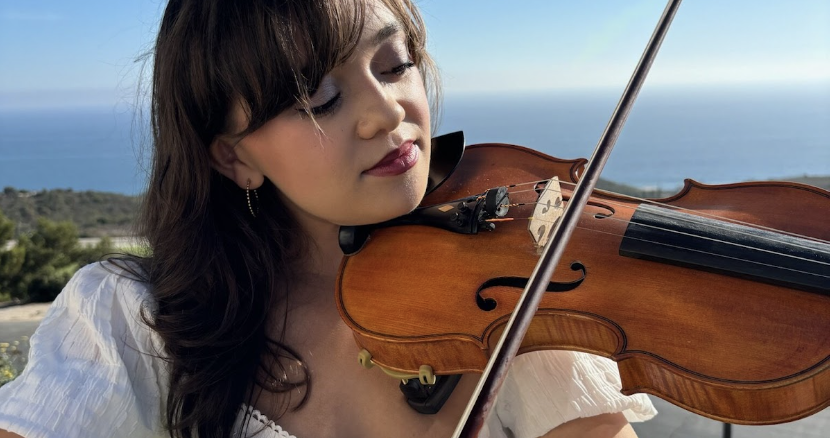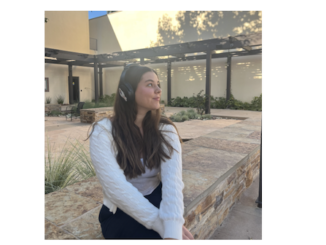
Astor Piazzolla’s “Nightclub 1960.”
This Spanish instrumental piece currently fills most of Alima Ovali’s waking moments.
The junior music major in violin performance is most anticipating performing this song in her upcoming junior recital Dec. 7 as a duet with senior guitarist Ripley Conklin.
Practicing twice weekly for this duet alone, she clocks in about eight hours of extra practice weekly for her junior recital. All of this is leading to her final big moment on stage, performing 30 minutes of music for the music department and larger community.
Every junior and senior within the music program at Pepperdine University must complete a performance showcasing their musical abilities. These recitals come after years of training and practice, and are a leadway to graduate programs, bigger professional gigs and more.
“I hope that people realize from this that I’m a musician who just wants to play music and create beauty,” Ovali said. “Not just to be the star or anything.”
Ida Nicolosi, assistant teaching instructor of vocal studies and recital coordinator, said the performances are the culmination of everything students have learned in the program. Ovali, along with junior guitarist Zachary Gamble, junior vocalist Andre Garabedian and senior vocalist Jace Vendelin, shared their excitement and nerves as they prepared for their big moment.
Students’ journey from humble beginnings to the big day
Every junior recital is 30 minutes of repertoire while every senior recital is 60 minutes. Instrumentalists typically perform anywhere from four to six songs in a junior recital, while vocalists perform about eight to 10. Vendelin’s program could include up to 14 songs.
Instrumentalists must showcase music from at least four different time periods that can include Baroque, romantic, classical and contemporary. Vocalists, on the other hand, must capture songs from at least four different languages that include Italian, German, French and English. After that they may choose any other languages they want to perform.
Student emotions about this big performance range from nervous to excited. All four students said they are thrilled to be able to perform their unique repertoire, but nervous about whether everything they’ve worked so hard to showcase will be up to par with their own standards and that of the music department.
When it comes to the big moment itself, all four students agreed there is a lot of performance anxiety. Gamble and Ovali said they handle it by accepting beforehand there will be mistakes and they just have to roll with it.
“There is one thing I do that really helps me,” Gamble said. “I close my eyes and go through my entire piece that I’m playing in my head and if I can imagine my fingers playing all the notes and I don’t have any memory slips then I know I’m good to go.”
Garbedian in particular is excited to perform a song about his Armenian culture but is nervous as this is his first solo performance. Vendelin is thrilled about his theme of Greek mythology but unsure about how 60 minutes of singing will affect the longevity of his voice.
Most musicians start out at an early age per their parents desire to get their child involved in something while they are young and to hone a skill throughout their life.
Both Ovali and Garabedian said their families kind of forced them into their respective musical careers at a young age and they did not appreciate it. Eventually they each grew to love it as they got older and more experienced.
On the other end of the spectrum, there are students who started later in their life. Gamble, who is a double major in music composition and guitar performance, said his music career began about seven years ago when he went to Hawaii and got a ukulele. He then moved to guitar and hasn’t stopped since.
Vendelin started his music career in seventh grade when a teacher told him to try choir. He said he fell in love with it and knew then that’s what he wanted to do with the rest of his life.
Students utilize preparation, practice and prayer
All four students and Nicolosi agreed that the recitals take a ton of work. The average recitalist practices around eight extra hours a week for their recital alone.
This doesn’t include everything else required of their music major. Nicolosi said vocal students are in choir, the opera and private lessons, while instrumentalists are part of chamber, orchestra, ensembles, private lessons and more.
To prepare for these recitals, students must choose with their private instructor what songs they are going to perform, who their accompanist is going to be and they must write scholarly program notes that give background information on their pieces.
Ovali said managing all of this is a lot and she has faced a lot of burnout in preparation for her upcoming recital.
“I take on a lot musically. It’s just a lot of repertoire all at once but yeah, it’s definitely a lot of burnout,” Ovali said. “And when you’re not feeling confident about yourself you just feel down. But as time goes on I think I’m getting a little more positive about the whole thing. It’s going to be what it’s going to be, I’m putting in as much effort as I possibly can.”
Both Garbedian and Gamble said a lot of prayer goes into preparation for any performance, and especially this recital.
“That’s one more thing that I lean on my faith for. I know that I can never be perfect and the only one that’s perfect is God,” Garbedian said. “So that gives me a sense of security knowing that I’m still loved by God and those around me even though I’m not perfect.”
Pepperdine takes musical education to the next level
Pepperdine changes the game in terms of musical education and prepares their music students for the real-world music industry, Nicolosi said. Learning how to balance music, academics and a life outside of music and school is essential.
“Pepperdine prepares them for the real world, because that’s what happens when you are a professional musician,” Nicolosi said. “You might be working a day job or you might be teaching, and then you have rehearsals in the evening. So it’s so important for them to learn how to multitask.”
Ovali said her time here at Pepperdine has really opened her eyes to her potential with music.
“I think that I have learned I have a lot of room to grow,” Ovali said. “Sometimes I’m like ‘Wow this is all bad,’ but I feel like I can look back on my time here at Pepperdine and think from where I’ve started I have really grown, I’ve learned things.”
Vendelin said Pepperdine is especially unique in the experiences it gives the music students, as it gives them so many opportunities to become comfortable with performing.
“That’s why the Pepperdine experience is so valuable,” Vendelin said “Because you get so many opportunities to perform for other people, for audiences, for peers and it’s just learning how to deal with that is a very important part to being a performer at Pepperdine.”
Students move beyond center stage
Junior and senior recitals are important for each student’s musical aspirations beyond Pepperdine. No matter what a student chooses to do with music after getting their degree, these performances help them prepare for the real-world music industry, Nicolosi said.
“The recital process I think is where it all begins for a student. They can find their passion for performing, and it’s a safe place,” Nicolosi said. “And with all the preparation, it’s just a wonderful opportunity for them to embody and embrace the art of performing.”
After Pepperdine, no student is entirely sure what they want to do with their degree. All four students mentioned performing and teaching.
The recitals are open to everyone in the community, Nicolosi said, but it is usually fellow music students in attendance and family and friends.
Vendelin said no matter what happens with this, or any, performance, he hopes he leaves people with something long after they’ve watched him perform.
“Expressing emotion, expressing humanity,” Vendelin said. “The biggest goal that I have in a performance is to make people feel things. I want someone to walk away a little bit different than they were before.”
Isabella Pisciotta reported this enterprise story in Jour 241 during the Fall 2024 semester under the supervision of Dr. Christina Littlefield and Dr. Theresa de los Santos. Dr. Littlefield supervised the web article.




